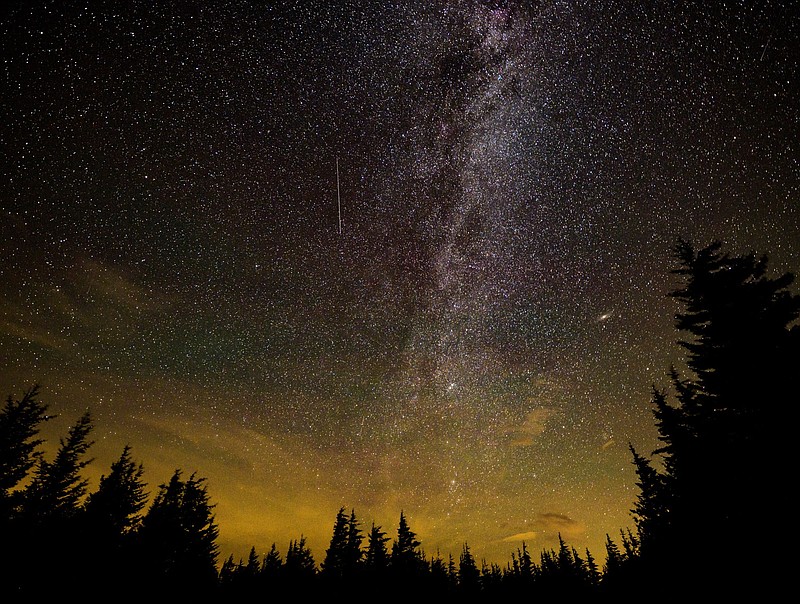The Northern Hemisphere is about to get the best meteor shower of the year this weekend.
In areas of low light pollution, Chattanoogans will be able to view the Perseid meteor shower Friday and Saturday. While the Perseid meteor shower occurs every year from about July 23 to August 22, the peak times to see it with the naked eye are midnight August 11 to dawn August 13, according to Almanac.com.
With swift and bright meteors, Perseids frequently leave long "wakes" of light and color behind them as they streak through Earth's atmosphere. The Perseids are one of the most plentiful showers with about 50 to 100 meteors seen per hour, NASA states.
And the best time to view them? Perseids are best viewed in the pre-dawn hours, although NASA states it is possible to view meteors from this shower as early as 10 p.m.
The last Supermoon of the year will also occur Thursday night around 9:30 p.m. and will be viewable from pretty much anywhere.
Below are some stargazing spots near and far to check it out:
Harrison Bay State Park
Address: 8411 Harrison Bay Road, Chattanooga (30 minutes from downtown Chattanooga)
Harrison Bay is home to the The Star Walk, which is the product of a two-year partnership between the park and Barnard Astronomical Society. Consisting of a half-mile gravel path encompassing 13 observation "stations" with instructions for unaided viewing of phenomena such as planets, constellations and galaxies, the Star Walk is based on the Sternenweg Grossmugl, a similar attraction about 20 miles north of Vienna, Austria.
The Star Walk is designed to be enjoyed with the naked eye without the need for observational equipment such as telescopes and binoculars. Each placard faces north and contains instructions for finding the designated objects using visual landmarks as a guide.
(READ MORE: 'Holy crap, it works!': How a Soddy-Daisy man learned to photograph the heavens)
Cloudland Canyon State Park
Address: Cloudland Canyon Park Road 122, Rising Fawn, Ga.(30 minutes from downtown Chattanooga)
Located on the western edge of Lookout Mountain, Cloudland Canyon is one of the largest and most scenic parks in the state. The Barnard Astronomical Society often hosts "star parties" at the park, although they won't be this weekend.
Chilhowee Overlook
Address: Oswald Road, Benton, Tenn. 37307 (1 hour from downtown Chattanooga)
Located in Polk County, this overlook is the go-to place for sightseeing for Bradley and Polk counties. The overlook gives an expansive view of the Ocoee River, Parksville Lake and its surrounding mountains. Plus, there's parking on-site
(READ MORE: The 10 best overlooks in the Chattanooga area to see fall colors)
Tamke-Allan Observatory
Address: 334 Caney Creek Rd, Rockwood, Tenn. (1 hour and 30 minutes from downtown Chattanooga)
Although it doesn't offer camping, this observatory is one of the finest in the area. Affiliated with Roane State Community College, it hosts frequent events that open the doors of the observatory to the public. It's the perfect opportunity for some education and high-powered stargazing. Then, you can retire to nearby Roane County Park, where you'll find a playground, splash pad, tennis courts, baseball field, 18-hole disc golf course, 1.2-mile paved walking trail, fishing, paddling and swimming opportunities and a few lakeside primitive camping spots.
Pickett State Park
Address: 4605 Pickett Park Hwy, Jamestown, Tenn. (2 hours and 45 minutes from Chattanooga)
In 2015, Pickett was certified as a dark-sky park by the International Dark Sky Association. The certification is no joke. In nearly a decade of reviewing applications, less than 40 parks have been identified - in the world - as meeting the organization's criteria. Pickett has strict lighting restrictions after sundown, and coupled with the site's remote location, it means the park is dark enough for the Milky Way to be clearly visible, making Pickett a must-visit for any astronomy-enthusiast.
- Compiled by Allison Shirk
